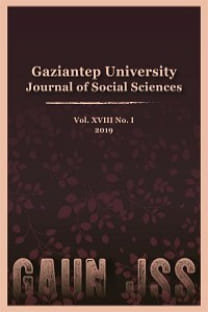Class Identities and Cultural Practices: New Debates on Recent Theories
Sınıf analizinin günümüz toplumlarında öne çıkan sosyal ve kültürel hiyerarşileri açıklamakta yetersiz kaldığı iddia edilmektedir. Bununla birlikte, bir grup sınıf kuramcısının yakın zamanlı çalışmalarında "sınıf öldü" tartışmalarına karşı çıkılırken, kültürel kimliklerin öne çıkarıldığı yeni bir sınıf analizi önerilmektedir. Bu makalede, söz konusu sınıf kuramcıları arasında yer alan Beverly Skeggs ve Mike Savage'in çalışmalarına odaklanarak kültürel formların sınıf ile ilişkisinin incelenmesinin sınıf analizine getireceği açılımlar üzerinde durulacaktır. Savage'in, Bennett vd. ile yürüttükleri yakın zamanlı çalışmaları Culture, Class, Distinction (2008)'da, Savage günümüz Britanya'sında sınıfı kültürel boyutuyla birlikte incelemektedir. Bununla birlikte, makalemde sınıfın gündelik yaşamda deneyimlemesinin bu biçimdeki sunumu eleştirilmektedir. Savage ve Bennett vd. söz konusu çalışmalarında sınıf kimlikleri belli belirsiz bir biçimde açıklanmakta ve gündelik yaşamdaki sınıf ve kimlik pratiklerinde öne çıkan sorulara yanıt verilememektedir. Bu eleştiri, günümüzde sınıf ve kültür süreçlerinin değiştiğini reddetmek anlamını taşımamakla birlikte, yazımda, sınıf ilişkilerinin nasıl yeniden kurulduğunun ve bunun sınıf kimliklerini nasıl etkilediğinin incelenmesinin önemine işaret edeceğim
Sınıf Kimlikleri ve Kültürel Pratikler: Çağdaş Sınıf Kuramında Öne Çıkan Tartışmalar
It has been claimed that class analysis cannot explain contemporary social hierarchy and new forms of cultural alignments. The recent works of class theorists, on the other hand, rejects the arguments of the "death of class," instead propose a modification of class theory with an emphasis on culture and identity. Drawing on Beverly Skeggs and Mike Savage's studies among this group, the paper argues that including cultural formations into class theory these studies bring along a new perspective to the subject. In a recent study with Bennett et al. Culture, Class, Distinction (2008) Savage focuses on cultural dimension of class in contemporary Britain. However, the article questions the way the study explains people's experiences of class in their everyday life. Indeed, the paper argues that Savage and Bennett et.al's work gives a vague explanation of class identities and cannot explain questions about the everyday practices of class and identity. This is not to deny that the pattern of class and culture has been changed, rather the paper urges us to consider how relations of class are made and re-made within everyday life and how this effects class identity
___
- Beck, U. (2005). Risk Society, London: Sage.
- Beck, U. & Beck-Gernsheim, E. (2002). Individualization: Institutionalized Individualism and its Social and Political Consequences, London: Sage.
- Bennette, T., Savage, M., Silva, E., Warde, A., Gayo-Cal, M. & Wright. D. (2008). Culture, Class, Distinction. London: Routledge.
- Bottero, W. (2004). Class Identities and the Identity of Class. Sociology 38(5):985-1003. doi: 10.1177/0038038504047182
- Bourdieu, P. (1998). The State Nobility. Cambridge: Polity.
- Bourdieu, P. (2000). Distinction: A Social Critique of the Judgment of Taste. London: Routledge & Kegan Paul.
- Cheng, S.L., Olsen, W., Southerton, D. & Warde, A. (2007). The Changing Practice of Eating: Evidence from UK Time Diaries, 1975 and 2000. The British Journal of Sociology, 58(1):39-61.doi: 10.1111/j.1468-4446.2007.00138.x
- Chan, T.W., & Goldthorpe, J. H. (2007). Social Stratification and Cultural Consumption: Music in
- England. European Sociological Review, 23(1):1-19. doi: 10.1093/esr/jcl016
- Devine, F. & Savage, M. (2000). Conclusion: Renewing Class Analysis, in R. Crampton, F. Devine, M. Savage, and J. Scott (eds.) Renewing Class Analysis, pp. 184-99. Oxford: Blackwell.
- Devine, F. (2004). Class Practices. Cambridge: Cambridge University Press.
- Le Roux, B., Rouanet H., Savage M. & Ward, A. (2008). Class and Cultural Division in the UK. Sociology 42(6):1049-1071. doi: 10.1177/0038038508096933
- Li Puma, E. (1995). Culture and the Concept of Culture in a Theory of Practice in C. Calhoun, E.
- LiPuma and M. Postone (eds.) Bourdieu: Critical Perspectives, pp. 14-34. Oxford: Polity Press.
- Pakulski, J.(2005). Foundations of a Post-class Analysis in E. O. Wright (ed.) Approaches to Class Analysis, pp.152-179. Cambridge: Cambridge University Press.
- Sayer, A. (2005). The Moral Significance of Class. Cambridge: Cambridge University Press.
- Savage, M. (2000). Class Analysis and Social Transformation. Philederphia: Open University Press.
- Savage, M, Bagnall, G. & Longhurst B. (2001). Ordinary, Ambivalent and Defensive: Class Identities in the Northwest of England. Sociology 35 (4): 875-92. doi: 10.1177/0038038501035004005 Scott, J. (2002). Social Class and Stratification in Late Modernity. Acta Sociologica 45(1):23-35. doi: 10.1177/000169930204500103
- Skeggs, B. (2001). Formations of Class and Gender. London:Sage.
- Surrige, P. (2007). Class Belonging: A Quantitative Exploration of Identity and Consciousness. The British Journal of Sociology 58(2): 207-226. doi: 10.1111/j.1468-4446.2007.00148.x
- ISSN: 1303-0094
- Yayın Aralığı: Yılda 4 Sayı
- Başlangıç: 1991
- Yayıncı: Gaziantep Üniv. Sosyal Bilimler Enst.
Sayıdaki Diğer Makaleler
Yüzyıl Sonu Kadın Yazarları: Yeni Kadının Kısa Öykülerinde Yeni Kadınsallığın Temsili
Dışa Açıklık, Doğrudan Yabancı Yatırımlar ve Yoksulluk İlişkisi: Türkiye Örneği
Ahmet ŞAHBAZ, Abdulkadir BULUŞ, Fatih KALECİ
Yunus KILIÇ, Mehmet Fatih BUĞAN, B. Dilek ÖZBEZEK
Keraia’da Bulunan Bir Yazıtın Yayımı Üzerine Bir Düzeltme
Social Media Strategies of The European Union Bodies: A Comparison With Turkey's Experience
Fin De Siècle Female Writers: Representing the New Femininity in the New Woman's Short Stories
Asimetrik Bilgi ve Sinyal Teorisi: Temettü ve Kazanç İlişkisinde Panel Nedensellik Yaklaşımı
B Dilek ÖZBEZEK, Mehmet Fatih BUĞAN, Yunus KILIÇ
Devletlerin Tanınması ve 1933 Montevideo Sözleşmesi
